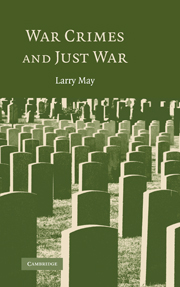1 - Introduction: Justifying War but Restricting Tactics
Published online by Cambridge University Press: 05 June 2012
Summary
A sense of honor may be said to forbid what the law permits.
Hugo Grotius, De Jure Belli ac Pacis, 1625, p. 716This is a book about the normative foundations of international criminal law, specifically international humanitarian law, concerning the violations of the rules and customs of war. The philosophy of international criminal law is both very old and very new. Debates about the rules of war have been ongoing for several thousand years, culminating in truly impressive and original work by Just War theorists in the 17th century, especially Hugo Grotius and Samuel Pufendorf. But it is also true that debates about the theoretical foundations of international criminal law are only in their infancy in that relatively few articles and books have been written about this subject since the Nuremberg trials, an event that caused a sea change in the way international law addressed war crimes. At Nuremberg, individuals rather than States were the subject of prosecution for war crimes, and the defense of superior orders was greatly curtailed. It is my hope to draw extensively on the older, Just War, tradition, in ways that will make these older ideas relevant for practitioners and theorists today, as well as to make political philosophers working in the Just War tradition aware of recent cases and legal theories that will enrich their philosophizing.
- Type
- Chapter
- Information
- War Crimes and Just War , pp. 1 - 22Publisher: Cambridge University PressPrint publication year: 2007



